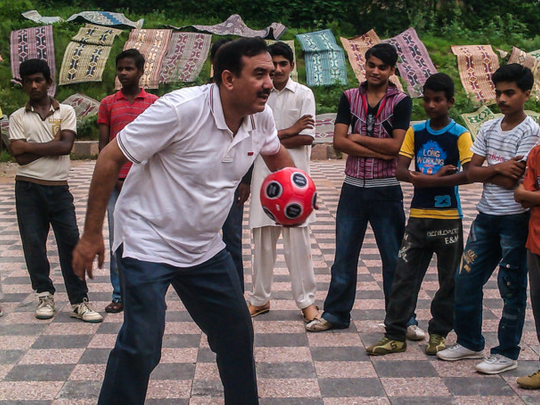
Pakistan’s future generation stands at a critical tipping point. The country needs to develop avenues to harness the potential of its demographic dividend — its youth — estimated to make up nearly half of a 300 million population by 2050. The solution then lies in a simple and safe avenue — sports.
The current security and economic challenges threaten to turn this demographic dividend into a disaster. The numbers speak for themselves: Pakistan spends seven times more on its military than on primary education; 25 million children are out of school; over 200,000 people have been internally displaced due to violence; seven million children, aged three to five, have yet to receive primary schooling.
Focus on youth
Now, sports looks like the answer to the country’s problems with various organisations coming forward to tap the youth’s potential. The end of last year saw Karachi-based Aman Foundation, a not-for-profit trust, sign a memorandum for understanding (MoU) with Real Madrid Foundation, the corporate social responsibility arm of the Spanish football club. The widely reported agreement will help Aman Foundation’s sports initiative Aman Sports establish the social sports school model in Pakistan. Together the two bodies are piloting the establishment of two schools aiming to impact over 400 boys and girls from ages 6 to 17.
This has come at a time when Fédération Internationale de Football Association (FIFA) has sanctioned $400,000 (about Dh1 million) to build the Karachi Football House. Karachi would be the second city for the FIFA Goal Project after Lahore where it pledged $512,608 towards building a headquarters. Other projects underway include four technical centres in Quetta, Jacobabad, Sukkur, and Abbotabad, costing a total of $200,000.
“The true strength of Pakistan lies in its demographical dividend. Pakistan is a nation blessed with natural wealth, this combined with the fact that 60 per cent of its population is under 25 years of age, should be a ticket to go to the head of the class,” says Aamir Bilal, CEO, Sports Development Foundation (SDF). “But unfortunately our youth faces serious problems because the life skill component is missing from our education.”
SDF is a registered sport development non-governmental organistion with Security and Exchange Commission of Pakistan. It is committed to promoting sport for youth development through sport education and is an important tool in helping the country achieve the United Nations Millennium Development Goals that Pakistan signed up for.
For the first time in the history, the nation appears to be taking cognizance of the youth — be it the media uproar surrounding education activist Malala Yousafzai or the recently held national elections where concerns for the youth came to the forefront. Legendry cricketer Imran Khan’s party Pakistan Tehreek-e-Insaf gave 35 per cent of its party tickets to under 35-year-olds, while promising the youth the chance to build a ‘new Pakistan’.
Beyond the conflict
Political rhetoric aside, analysts are quick to point out that in reality none of the major political parties offered realistic policies to take advantage of Pakistan’s rapidly growing population and if measures weren’t taken soon enough the country’s future appeared bleak.
It appears the only solution to get out of this sticky wicket is to focus on instilling sporting values in the youth of Pakistan. A noble but by no means an easy endeavour. “It’s not just the monies,” points out Faisal Mirza, Executive Director, Aman Sports, “Over 98 per cent of children in Pakistan do not have access to organised sports. In Khyber Pakhtunkhwa 90 per cent of municipal schools have no playgrounds. In developed nations sports takes up anywhere between 6-10 per cent of allocated funds, in Pakistan the number is negligible.”
The cost of providing sporting facilities in schools is quite low, points out Mirza, weighing in at around $200 per school per year, or just $1.5 per child, a cost achievable given the scale and potential that exists.
Mirza is convinced that a sporting outlook will work because, “Sports is not tainted by politics, ethnicity or religious biases. It is a secular and safe initiative, allowing multinationals and corporates to easily align themselves to a cause.”
Sports as a catalyst
Bilal too believes that sports is the best way of bringing a change among youth in general and society as whole, and promote mutual coexistence, peace and conflict resolution. A theory that’s already proved successful, especially where the Karachi United Football Foundation (Kuff) is concerned. “Where much of the violence in Karachi has been caused by ethnic rivalries, we feel Kuff is a poster child for how we can live together in harmony,” says Imran Ali, CEO, Kuff.
“Sports cuts through all the negativity. It’s an activity that everybody, even extremists know is innocent so there is very little misunderstanding. At Kuff, we bring together players from over six to seven ethnic areas to play together,” explains Ali.
Kuff is the not-for-profit entity of the Karachi United Football Club and is successfully using sports as a catalyst for social development. From camps for the disabled to training the girl child and helping the marginalised youth in Karachi come to terms with extremism, Kuff believes in engaging the youth through the power of football. ■







